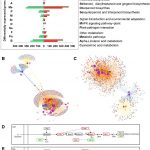Remorin and Plant Death
Programmed cell death (PCD) in plants is closely associated with a wide variety of biological processes, including cell differentiation,  aleurone layer formation, tapetum degradation, leaf and fruit resistance, pathogen invasion and abiotic stresses. Plant PCD is a complex genetically programmed mechanism, which is regulated by many factors. Reactive oxygen species (ROS) play a vital role in the regulation of plant cell death, senescence and resistance response. ROS generated by Respiratory Burst Oxidase Homolog (RBOH) proteins have important functions in the cell death, especially in hypersensitive response, which is a type of PCD induced by pathogens. Remorins (REMs) are plant-specific plasma membrane proteins with varied biological functions, but their function in PCD and plant defense remains largely unknown Cai et al. (10.1104/pp.20.00120) report a role for remorin in disease resistance, immune response, and PCD regulation. Overexpression of tomato (Solanum lycopersicum) REMORIN1 (SlREM1) increased the susceptibility of tomato to the necrotrophic fungus Botrytis cinerea and heterologous expression of this gene triggered cell death in Nicotiana benthamiana leaves. Intriguingly, multiple tomato REMs induced cell death in N. benthamiana leaves. Remorin proteins were also found to form homo- and hetero-complexes. The authors report that a type of N. benthamiana RBHO was up-regulated in SlREM1-expressing leaves. Heterologous expression of SlREM1 increased ROS accumulation and triggered other cell death regulators. These findings indicate that SlREM1 is a positive regulator of plant cell death and provide new insights into the PCD molecular regulatory network in plants.
aleurone layer formation, tapetum degradation, leaf and fruit resistance, pathogen invasion and abiotic stresses. Plant PCD is a complex genetically programmed mechanism, which is regulated by many factors. Reactive oxygen species (ROS) play a vital role in the regulation of plant cell death, senescence and resistance response. ROS generated by Respiratory Burst Oxidase Homolog (RBOH) proteins have important functions in the cell death, especially in hypersensitive response, which is a type of PCD induced by pathogens. Remorins (REMs) are plant-specific plasma membrane proteins with varied biological functions, but their function in PCD and plant defense remains largely unknown Cai et al. (10.1104/pp.20.00120) report a role for remorin in disease resistance, immune response, and PCD regulation. Overexpression of tomato (Solanum lycopersicum) REMORIN1 (SlREM1) increased the susceptibility of tomato to the necrotrophic fungus Botrytis cinerea and heterologous expression of this gene triggered cell death in Nicotiana benthamiana leaves. Intriguingly, multiple tomato REMs induced cell death in N. benthamiana leaves. Remorin proteins were also found to form homo- and hetero-complexes. The authors report that a type of N. benthamiana RBHO was up-regulated in SlREM1-expressing leaves. Heterologous expression of SlREM1 increased ROS accumulation and triggered other cell death regulators. These findings indicate that SlREM1 is a positive regulator of plant cell death and provide new insights into the PCD molecular regulatory network in plants.



